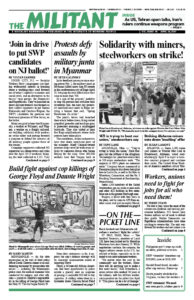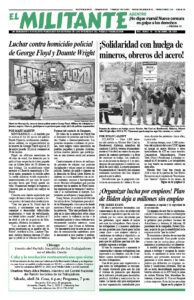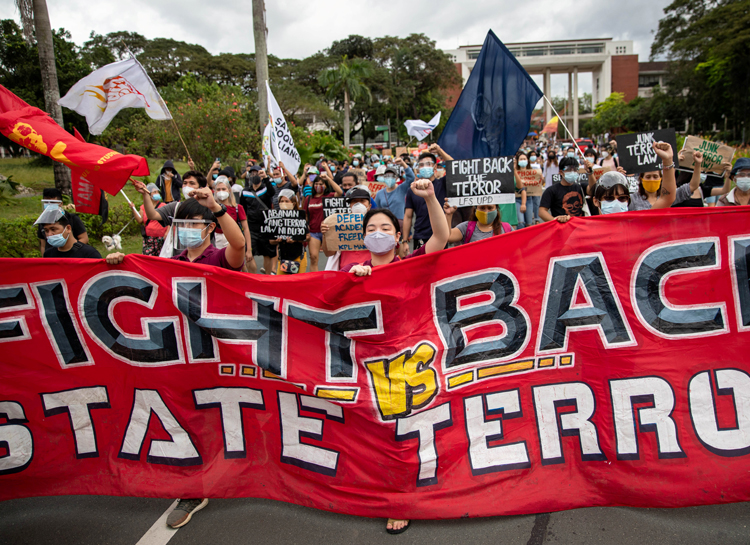AUCKLAND, New Zealand — Working people in the Philippines face deadly repression as they look for ways to defend themselves from the impact of the worldwide capitalist crisis. President Rodrigo Duterte’s government is stepping up its assaults, including the killing of trade union and political activists.
Duterte ordered state forces to “ignore human rights” and kill “communist rebels” March 5, targeting the Communist Party of the Philippines and its armed wing, the New People’s Army. Two days later, cops, backed by the military, shot dead nine unarmed labor and political organizers in coordinated raids near Manila. Six others were arrested.
Over 300 labor and political activists opposed to Duterte’s regime have been killed since he became president in 2016, according to Philippine rights group Karapatan.
Government forces shot dead nine farmers Dec. 30 on Panay island in the central Philippines. All were unarmed leaders of the indigenous Tumandok people, who were defending their lands against government plans to construct a dam that would force thousands from their homes.
For years Duterte has waged a “war on drugs,” unleashing cops and armed thugs who have killed thousands, particularly young people in working-class neighborhoods. The government says its assaults have led to 6,000 deaths, while rights groups say the toll is more than 27,000. During the past year these killings have surged.
Like capitalist governments elsewhere, the Duterte regime has used the coronavirus pandemic to bolster its powers, imposing a brutally enforced lockdown. After hungry protesters in Manila defied the lockdown demanding food, Duterte gave orders to the police and military: “If they fight you, shoot them dead.”
Workers protest job cuts
“The question of jobs is central,” Genoveva Valdez, a teacher in the Philippines, wrote the Militant discussing the impact on working people of the government’s response to the pandemic. “Taxi and jeepney drivers, construction workers and vendors initially took much of the hit, but many more Filipinos are now without jobs.”
This includes 400,000 Filipinos who have had to return home after losing jobs overseas.
Hundreds of workers protested outside the First Glory Philippines garment factory in the Mactan Economic Zone in Cebu Nov. 30 after the company fired 300. This included the union president, Cristito Pangan, and other workers involved in an effort to organize a trade union.
Cops have set up special units to target workers organizing unions, saying these units were “the first line of defense from radical labor infiltration of the labor force.”
“When you say any opinion against the government, the next day you might be ‘red tagged’ as a leftist or even worse, a communist,” Jose Fernandez told the Militant. “Your point of view might endanger your life.” He is a supermarket worker here in New Zealand originally from the Philippines.
But people “are only scared for a short time,” he said. “If there is something wrong with a government policy, if you are fighting for what is right, there is no reason to stop.” The term “red tagging” is given to the government’s labeling of individuals who it alleges are supporters of the Communist Party of the Philippines and New People’s Army. This creates a hit list of unionists, political activists and other critics of the government.
For over half a century, NPA groups have been engaged in armed clashes against government troops in mountainous parts of the countryside. The CPP and the NPA are Maoist, the dominant version of Stalinism in the Philippines. Their political course has prevented many working people — looking for ways to fight successive capitalist governments — from finding a revolutionary road forward.
Duterte included figures nominated by the CPP in his cabinet for a year after his election. But then he ended peace talks with the Maoist groups Nov. 23, 2017, after armed clashes between them and government forces. Twelve days later he signed a proclamation designating both the CPP and NPA as “terrorist” organizations.
Last June the government passed a new anti-terrorism law. “Suspected ‘terrorists’ can be arrested without any warrant,” Valdez told the Militant. It’s obvious “the law is not to squelch terror but to squelch dissent, to shut down protests.”
Recent protests against the government have mostly taken place on campuses, Valdez wrote. In January the government tore up a 1989 agreement barring cops from entering the University of the Philippines, alleging the NPA was recruiting people there. A large crowd gathered at the university to protest the attack on political rights.


